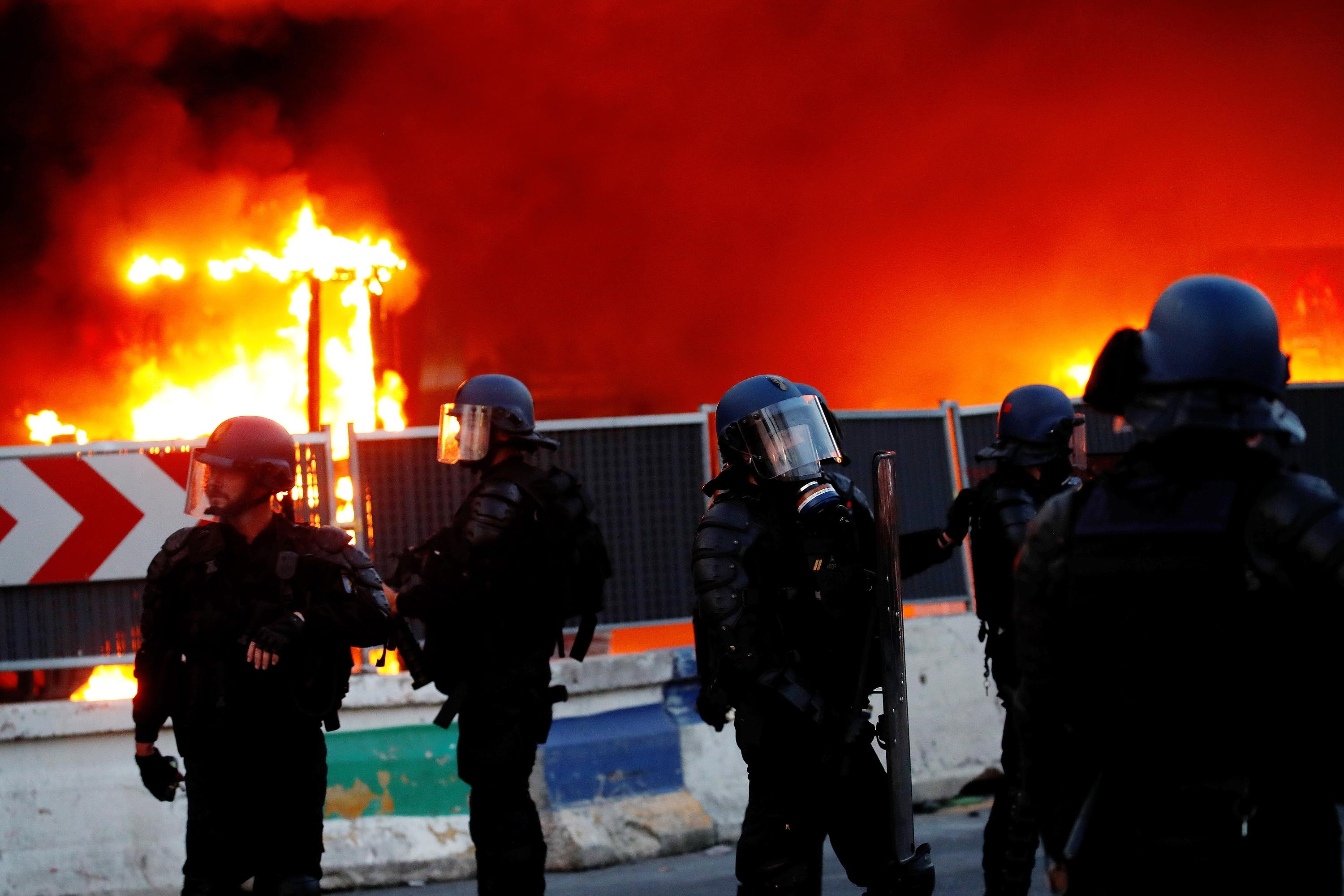Protect without helping. This is the subtle balance that was to be found on Tuesday by the energy ministers of the Twenty-seven, gathered in a sort of last chance meeting aimed at defining the future functioning of the electricity market within the 'European Union. They reached an agreement, which marks a crucial step and ends months of deaf dialogue between France and Germany. From a formal point of view, the ball is now in the European Parliament's court with a first meeting set for October 19 at 11 a.m. The goal now is to find common ground by the end of the year.
As it currently stands, the text resulting from the Council should allow France to have an electricity price which “reflects the cost of production of its energy mix”, explained the Ministry of Energy Transition on Tuesday evening. For Paris, the challenge is to allow French consumers, whether individuals or businesses, to benefit from its particular energy mix. With its 56 nuclear reactors, ensuring around 70% of national electricity consumption, the country has relatively cheap electrons. Except that, until now, the wholesale price of electricity was not directly linked to the average production cost but to that of the last power plant called. Or, in periods of high tension on the network, gas power stations. As long as the prices of the latter were low, this did not pose a problem, but with the war in Ukraine, they skyrocketed, bringing with them that of electricity.
With the new agreement, tracing the contours of “market design”, electricity prices should reflect those of production thanks to the implementation of contracts for difference (CFD). This “two-way” mechanism is based on the signing of long-term contracts between public entities (the State) and electricity producers. A benchmark price per megawatt hour is defined. When that of the wholesale electricity market soars, the difference perceived by the producer between this benchmark price and the reality is returned to the State, which can redistribute it to consumers. It is a way to protect them “without putting in place costly price shields”, recalled Agnès Pannier-Runacher, the Minister of Energy. Otherwise, when wholesale prices collapse, the State compensates the producer by paying him the difference between the benchmark price and the wholesale price.
The system is frequently used during calls for tenders by the Energy Regulatory Commission (CRE) for the allocation of new photovoltaic parks and land or maritime wind farms. But it could not be applied to the existing nuclear fleet. The expected generalization - and defended by France - of this principle must therefore result in a smoothing of electricity prices for consumers and better visibility on their income for producers. Not everything is resolved, however. Because the question of the cost of producing nuclear electricity has not been resolved. It should also be the subject of fierce discussions between the State and EDF, but also between France and its European partners (notably the Germans) who do not want to see France offer manufacturers lower prices. energy very very competitive, and therefore, risk distortion of competition. The challenge will be to find a level that reflects reality, while being acceptable to all parties (EDF, the Élysée, Brussels, industrialists, etc.).
Avenues have already been opened, with the publication by the CRE of a cost of producing nuclear electricity at 60 euros per MWh, “close to those of renewable electricity”, the Élysée recalled last night. A way to reassure Berlin which is relying massively on wind and solar power. This cost foreshadows what the price of electricity in France could be tomorrow. To this should be added the producers' margin - EDF is all the more sensitive to this as it must finance all or part of the new nuclear power - but also various taxes and electricity transport costs. “The agreement allows us to think calmly about the regulation of existing and future nuclear power,” summarized the Élysée. The negotiation sets a general framework, different from the negotiation with EDF, which is another subject. If the final price is far from being established, the agreement should guarantee real visibility in the medium term on the invoices paid by consumers - individuals and businesses - and avoid sudden surges.

 What is chloropicrin, the chemical agent that Washington accuses Moscow of using in Ukraine?
What is chloropicrin, the chemical agent that Washington accuses Moscow of using in Ukraine? Poland, big winner of European enlargement
Poland, big winner of European enlargement In Israel, step-by-step negotiations for a ceasefire in the Gaza Strip
In Israel, step-by-step negotiations for a ceasefire in the Gaza Strip BBVA ADRs fall almost 2% on Wall Street
BBVA ADRs fall almost 2% on Wall Street Children born thanks to PMA do not have more cancers than others
Children born thanks to PMA do not have more cancers than others Breast cancer: less than one in two French women follow screening recommendations
Breast cancer: less than one in two French women follow screening recommendations “Dazzling” symptoms, 5,000 deaths per year, non-existent vaccine... What is Lassa fever, a case of which has been identified in Île-de-France?
“Dazzling” symptoms, 5,000 deaths per year, non-existent vaccine... What is Lassa fever, a case of which has been identified in Île-de-France? Sánchez cancels his agenda and considers resigning: "I need to stop and reflect"
Sánchez cancels his agenda and considers resigning: "I need to stop and reflect" “Amazon product tester”: the gendarmerie warns of this new kind of scam
“Amazon product tester”: the gendarmerie warns of this new kind of scam “Unjustified allegations”, “promotion of illicit products”… Half of the influencers controlled in 2023 caught by fraud repression
“Unjustified allegations”, “promotion of illicit products”… Half of the influencers controlled in 2023 caught by fraud repression Extension of the RER E: Gabriel Attal welcomes a “popular” ecology project
Extension of the RER E: Gabriel Attal welcomes a “popular” ecology project WeWork will close 8 of its 20 shared offices in France
WeWork will close 8 of its 20 shared offices in France “We were robbed of this dignity”: Paul Auster’s wife denounces the betrayal of a family friend
“We were robbed of this dignity”: Paul Auster’s wife denounces the betrayal of a family friend A masterclass for parents to fill in their gaps before Taylor Swift concerts
A masterclass for parents to fill in their gaps before Taylor Swift concerts Jean Reno publishes his first novel Emma on May 16
Jean Reno publishes his first novel Emma on May 16 Cannes Film Festival: Meryl Streep awarded an honorary Palme d’Or
Cannes Film Festival: Meryl Streep awarded an honorary Palme d’Or Omoda 7, another Chinese car that could be manufactured in Spain
Omoda 7, another Chinese car that could be manufactured in Spain BYD chooses CA Auto Bank as financial partner in Spain
BYD chooses CA Auto Bank as financial partner in Spain Tesla and Baidu sign key agreement to boost development of autonomous driving
Tesla and Baidu sign key agreement to boost development of autonomous driving Skoda Kodiaq 2024: a 'beast' plug-in hybrid SUV
Skoda Kodiaq 2024: a 'beast' plug-in hybrid SUV The home mortgage firm rises 3.8% in February and the average interest moderates to 3.33%
The home mortgage firm rises 3.8% in February and the average interest moderates to 3.33% This is how housing prices have changed in Spain in the last decade
This is how housing prices have changed in Spain in the last decade The home mortgage firm drops 10% in January and interest soars to 3.46%
The home mortgage firm drops 10% in January and interest soars to 3.46% The jewel of the Rocío de Nagüeles urbanization: a dream villa in Marbella
The jewel of the Rocío de Nagüeles urbanization: a dream villa in Marbella Europeans: a senior official on the National Rally list
Europeans: a senior official on the National Rally list Blockade of Sciences Po: the right denounces a “drift”, the government charges the rebels
Blockade of Sciences Po: the right denounces a “drift”, the government charges the rebels Even on a mission for NATO, the Charles-de-Gaulle remains under French control, Lecornu responds to Mélenchon
Even on a mission for NATO, the Charles-de-Gaulle remains under French control, Lecornu responds to Mélenchon “Deadly Europe”, “economic decline”, immigration… What to remember from Emmanuel Macron’s speech at the Sorbonne
“Deadly Europe”, “economic decline”, immigration… What to remember from Emmanuel Macron’s speech at the Sorbonne These French cities that will boycott the World Cup in Qatar
These French cities that will boycott the World Cup in Qatar Champions Cup: Toulouse with Flament and Kinghorn against Harlequins, Ramos replacing
Champions Cup: Toulouse with Flament and Kinghorn against Harlequins, Ramos replacing Tennis: still injured in the arm, Alcaraz withdraws from the Masters 1000 in Rome
Tennis: still injured in the arm, Alcaraz withdraws from the Masters 1000 in Rome Sailing: “Like a house that threatens to collapse”, Clarisse Crémer exhausted and in tears aboard her damaged boat
Sailing: “Like a house that threatens to collapse”, Clarisse Crémer exhausted and in tears aboard her damaged boat NBA: Patrick Beverley loses his temper and throws balls at Pacers fans
NBA: Patrick Beverley loses his temper and throws balls at Pacers fans


















